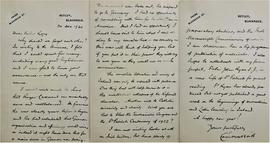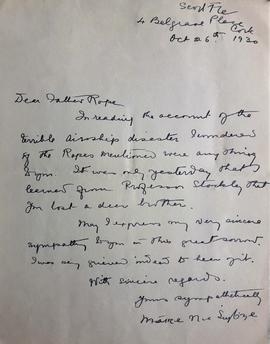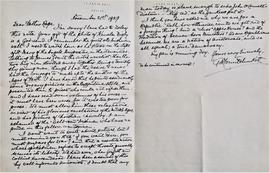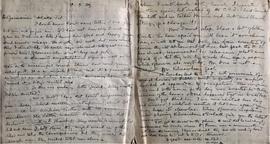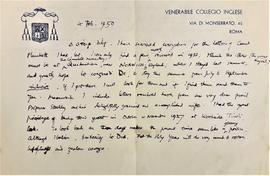Letters to Fr. Henry Rope mainly from Irish correspondents. The file includes letters from Fr. Patrick Nolan OSB (Erdington Abbey, Birmingham), Fr. John O’Brien SJ (19 July 1916, writes ‘I know how much you sympathize with Ireland. Many Englishmen of the ruling class seem hopelessly unable to understand Ireland.’), Hugh A. McCartan (4 Gifford Avenue, Sandymount, Dublin. Refers to the contemporary political situation in Ireland and to the Sinn Féin movement, 26 Aug. 1917), Barry M. Egan (32 Patrick Street, Cork. Refers to the murder of Tomás Mac Curtain and the independence struggle, 10 Dec. 1920), Daniel Corkery, Joseph Robinson (‘Poblacht na hEireann / (Scottish Edition’, Glasgow), Violet O’Connor, Domhnall Óg Ó Ceallacháin (Donal Óg O’Callaghan), Fr. P.J. Connolly SJ (editor, ‘Studies / An Irish Quarterly Review’, 35 Lower Lesson Street, Dublin), Fr. Thomas Dawson OMI (House of Retreat, Inchicore, Dublin, includes a description of the events of Bloody Sunday in Croke Park on 21 Nov. 1920), Thomas Kelly (67 King Street, New York), Shane Leslie, Fr. Martin Branagan, ‘The Herald / The National Labour Weekly’), J.R. Carey (St. Patrick’s Guild, 46 Middle Abbey Street, Dublin), Mairead O’Connell (Derrynane Abbey, Caherdaniel, County Derry), Fr. Patrick MacSwiney (Presbytery, Kinsale, County Cork), Nuala Moran (‘The Leader’, 205 Pearse Street, Dublin), M.H. Gill & Son Ltd. (50 Upper O’Connell Street, Dublin), Fr. Augustine O’Neill OFM (‘Assisi’, 4 Merchants’ Quay, Dublin. Refers to potential publications of articles by Father Rope in the periodical, 24 Jan. 1933). The file also includes two letters from Fr. Henry Rope to Canon Moriarty (1917).

